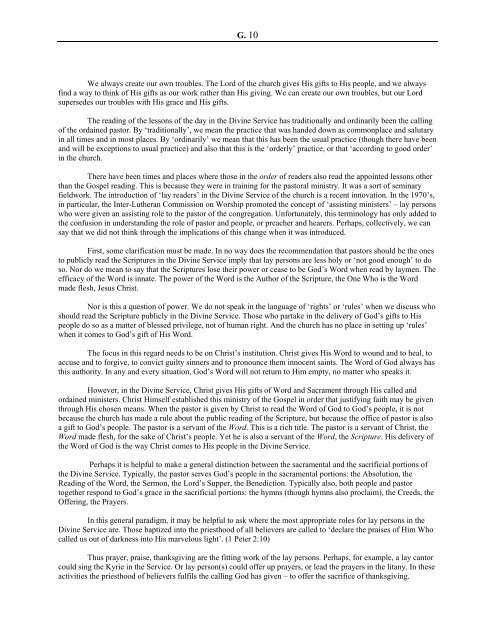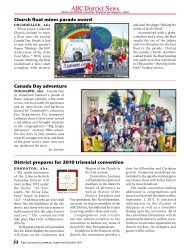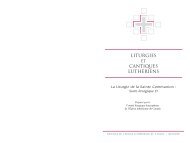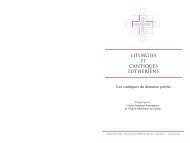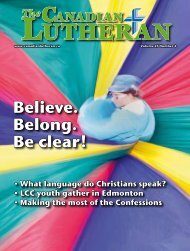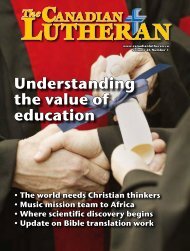Planned Giving Gift Summary - Lutheran Church-Canada
Planned Giving Gift Summary - Lutheran Church-Canada
Planned Giving Gift Summary - Lutheran Church-Canada
You also want an ePaper? Increase the reach of your titles
YUMPU automatically turns print PDFs into web optimized ePapers that Google loves.
G. 10<br />
We always create our own troubles. The Lord of the church gives His gifts to His people, and we always<br />
find a way to think of His gifts as our work rather than His giving. We can create our own troubles, but our Lord<br />
supersedes our troubles with His grace and His gifts.<br />
The reading of the lessons of the day in the Divine Service has traditionally and ordinarily been the calling<br />
of the ordained pastor. By ‘traditionally’, we mean the practice that was handed down as commonplace and salutary<br />
in all times and in most places. By ‘ordinarily’ we mean that this has been the usual practice (though there have been<br />
and will be exceptions to usual practice) and also that this is the ‘orderly’ practice, or that ‘according to good order’<br />
in the church.<br />
There have been times and places where those in the order of readers also read the appointed lessons other<br />
than the Gospel reading. This is because they were in training for the pastoral ministry. It was a sort of seminary<br />
fieldwork. The introduction of ‘lay readers’ in the Divine Service of the church is a recent innovation. In the 1970’s,<br />
in particular, the Inter-<strong>Lutheran</strong> Commission on Worship promoted the concept of ‘assisting ministers’ – lay persons<br />
who were given an assisting role to the pastor of the congregation. Unfortunately, this terminology has only added to<br />
the confusion in understanding the role of pastor and people, or preacher and hearers. Perhaps, collectively, we can<br />
say that we did not think through the implications of this change when it was introduced.<br />
First, some clarification must be made. In no way does the recommendation that pastors should be the ones<br />
to publicly read the Scriptures in the Divine Service imply that lay persons are less holy or ‘not good enough’ to do<br />
so. Nor do we mean to say that the Scriptures lose their power or cease to be God’s Word when read by laymen. The<br />
efficacy of the Word is innate. The power of the Word is the Author of the Scripture, the One Who is the Word<br />
made flesh, Jesus Christ.<br />
Nor is this a question of power. We do not speak in the language of ‘rights’ or ‘rules’ when we discuss who<br />
should read the Scripture publicly in the Divine Service. Those who partake in the delivery of God’s gifts to His<br />
people do so as a matter of blessed privilege, not of human right. And the church has no place in setting up ‘rules’<br />
when it comes to God’s gift of His Word.<br />
The focus in this regard needs to be on Christ’s institution. Christ gives His Word to wound and to heal, to<br />
accuse and to forgive, to convict guilty sinners and to pronounce them innocent saints. The Word of God always has<br />
this authority. In any and every situation, God’s Word will not return to Him empty, no matter who speaks it.<br />
However, in the Divine Service, Christ gives His gifts of Word and Sacrament through His called and<br />
ordained ministers. Christ Himself established this ministry of the Gospel in order that justifying faith may be given<br />
through His chosen means. When the pastor is given by Christ to read the Word of God to God’s people, it is not<br />
because the church has made a rule about the public reading of the Scripture, but because the office of pastor is also<br />
a gift to God’s people. The pastor is a servant of the Word. This is a rich title. The pastor is a servant of Christ, the<br />
Word made flesh, for the sake of Christ’s people. Yet he is also a servant of the Word, the Scripture. His delivery of<br />
the Word of God is the way Christ comes to His people in the Divine Service.<br />
Perhaps it is helpful to make a general distinction between the sacramental and the sacrificial portions of<br />
the Divine Service. Typically, the pastor serves God’s people in the sacramental portions: the Absolution, the<br />
Reading of the Word, the Sermon, the Lord’s Supper, the Benediction. Typically also, both people and pastor<br />
together respond to God’s grace in the sacrificial portions: the hymns (though hymns also proclaim), the Creeds, the<br />
Offering, the Prayers.<br />
In this general paradigm, it may be helpful to ask where the most appropriate roles for lay persons in the<br />
Divine Service are. Those baptized into the priesthood of all believers are called to ‘declare the praises of Him Who<br />
called us out of darkness into His marvelous light’. (1 Peter 2:10)<br />
Thus prayer, praise, thanksgiving are the fitting work of the lay persons. Perhaps, for example, a lay cantor<br />
could sing the Kyrie in the Service. Or lay person(s) could offer up prayers, or lead the prayers in the litany. In these<br />
activities the priesthood of believers fulfils the calling God has given – to offer the sacrifice of thanksgiving.


